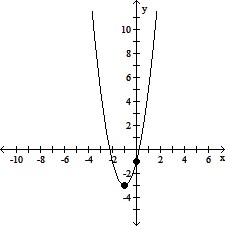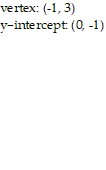Find T, N, and B for the given space curve.r(t) =  (1 + t)3/2i +
(1 + t)3/2i +  (1 - t)3/2j +
(1 - t)3/2j +  tk
tk
A. T = 
 i -
i - 
 j +
j +  k; N =
k; N = 
 i +
i + 
 j ; B = -
j ; B = - 
 i +
i + 
 j +
j +  k
k
B. T = 
 i +
i + 
 j +
j +  k; N =
k; N = 
 i +
i + 
 j; B =
j; B = 
 i +
i + 
 j +
j +  k
k
C. T = 
 i -
i - 
 j +
j +  k; N =
k; N = 
 i +
i + 
 j; B = -
j; B = - 
 i +
i + 
 j +
j +  k
k
D. T = 
 i -
i - 
 j +
j +  k; N =
k; N = 
 i +
i + 
 j; B = -
j; B = - 
 i +
i + 
 j +
j + 
 k
k
Answer: A
You might also like to view...
Rewrite the polynomial in descending order.x6 + x + 9x3 + 1 + 5x2
A. 9x3 + 5x2 + 1 + x6 + x B. x + 5x2 + 9x3 + x6 + 1 C. x6 + 9x3 + 5x2 + x + 1 D. 1 + x + 5x2 + 9x3 + x6
Write the system of linear equations that the augmented matrix represents.
A.
| 20x | + 12y | = 15 |
| 5x | + 16y | = 19 |
B.
| 20x | + 12y | = 15 |
| 16x | + 5y | = 19 |
C.
| 20x | + 12y | = -15 |
| 16x | + 5y | = -19 |
D.
| 12x | + 20y | = 15 |
| 16x | + 5y | = 19 |
Solve the inequality, and graph the solution set.v2 + 10v + 24 ? 0![]()
A. [-4, ?)![]()
B. [-6, -4]![]()
C. (-?, -6]![]()
D. (-?, -6] ? [-4, ?)![]()
Analyze the graph and write the equation of the function it represents in standard form f(x) = a(x - h)2 + k.

A. f(x) = 2(x - 1)2 - 3 B. f(x) = -2(x + 1)2 - 3 C. f(x) = 2(x + 1)2 - 3 D. f(x) = 2(x + 1)2 + 3